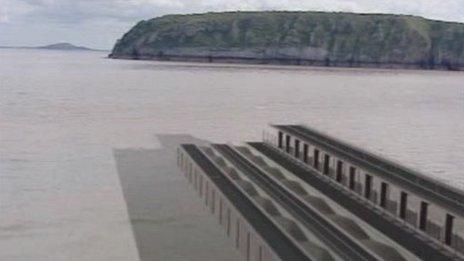Severn barrage: £30bn project examined by David Cameron's officials
- Published

An artist's impression of one model of the planned Severn barrage
Plans for a £30bn barrage across the Severn estuary have been given a boost after Prime Minister David Cameron instructed officials to look into them.
It follows a meeting with Peter Hain, who left his post as shadow Welsh secretary to back the project.
Supporters say the barrage, from the Vale of Glamorgan to Somerset, would provide 5% of the UK's electricity and create thousands of jobs.
But environmentalists object, and say it would harm local wildlife.
It is understood much of the funding for the scheme would come from Kuwait and Qatar.
"We had a very good meeting - the prime minister promised to look into it," Mr Hain told BBC Wales.
"It was a more productive meeting than might have been expected. It's encouraging that Number 10 are taking the barrage much more seriously than has been the case over the last few years.
"Government support is an absolute pre-requisite for getting the whole project underway.
"Not a penny of taxpayers' money would be needed for this £30bn investment, which would be transformative for Wales.
"It would create 20,000 jobs in construction and another 30,000 in activity around the barrage."
The UK government previously rejected plans following a two-year feasibility study found the cost could be up to £34bn, double the initial estimate.
Privately financed
It did not, however, rule out private schemes.
Last year, the Corlan Hafren consortium submitted a business plan to the Department of Energy and Climate Change outlining a new proposal.
Mr Hain said this project would not call on public funds but would be entirely privately financed.
It wants to generate electricity on both ebb and flow tides and includes an extra 800 turbines.
The change may have some environmental benefits in reducing flood risk and improving coastal drainage upstream, according to the consortium.
But the barrage will still reduce the tidal range, which is the second highest in the world, from 14m (about 46ft) at spring tide to 7m (about 23ft).
The barrage could also have a road and railway running along the top.
A Downing Street spokesman said: "The prime minister met Peter Hain and Corlan Hafren last month to discuss the Severn barrage proposal.
Divided opinion
"The government is keen to promote a diverse range of energy supply and will consider the proposals carefully."
However, the project has divided opinion.
Debbie Pain, director of conservation with the Wildfowl and Wetlands Trust said: "The Severn estuary with its incredibly large tides is absolutely the right place to be looking to generate tidal energy. However, that must not come at the expense of the natural environment."
She said the trust had not seen the details of the proposal and remained open-minded.
But Dr Pain added: "However, if it is still going to make a vast difference to the tidal range, it is going to change the estuary dramatically. That sort of damage simply cannot be compensated for elsewhere.
"The government would have to demonstrate that it is adhering in principle and practice to the legally binding EU Habitats and Birds Directives."
In May, a spokesperson for the RSPB said it "wishes to see Severn tidal energy harnessed but not at the expense of important and protected wildlife".
"We will support technologies or alternative schemes that could deliver this, but the conventional barrage would be an environmental disaster and be in breach of the EU habitats directive."
A spokesperson for Friends of the Earth has also said that harnessing tidal energy was "vitally important," but called this project "the wrong solution".
Friends of the Earth said tidal energy can be captured "by other technologies with considerably less damaging consequences".
"Putting all our eggs into one risky project would block other possibilities, and the growth in jobs and technology these could produce."
- Published25 July 2012
- Published26 April 2012
- Published14 May 2012
- Published14 May 2012
- Published18 April 2012
- Published7 December 2011